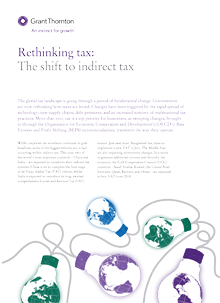-
Waarderingen
Voor organisaties die betrokken zijn bij een transactie, geschil, fusie, overname of herstructurering, is de waarde van de betrokken onderneming en haar activa een cruciale commerciële overweging. Een duidelijk en goed onderbouwd oordeel over de waarde is essentieel. Voor proces voerende partijen is een professionele waardering vaak de sleutel tot een eerlijke oplossing.
-
Due diligence onderzoek
Het due diligence-onderzoek brengt de risico's in kaart en onderzoekt mogelijke financiële, fiscale, juridische of operationele valkuilen. Wij bieden robuuste due diligence-diensten aan, die duidelijk zijn afgestemd op de vereisten van onze klanten.
-
Onafhankelijk advies bij overnames
Wilt u uw bedrijf verkopen of liever door een overname laten groeien?
-
Vennootschapsrechtelijke reorganisaties
De hertekening van je groepsstructuur kan een aanzienlijke kostenbesparing en/of efficiëntieverbetering betekenen. De herstructureringen van het Wetboek van Vennootschappen en Verenigingen (fusie, splitsing, inbreng of overdracht van bedrijfstak, ...) bezorgen u de juridische middelen om dit te bewerkstelligen.
-
Juridische begeleiding
Fusies en overnames betekenen een uitdaging voor dynamische organisaties. Als manager of ondernemer wil je die uitdaging langs alle kanten bekijken om de beste voorwaarden te bekomen. Daarom werken onze professionals bij fusie-, verkoop- of overnametrajecten op basis van integraal procesmanagement.

-
Transfer pricing
Onze experten helpen uw transfer pricing te documenteren en uw intra-groepstransacties en rapportering te organiseren. Zij ontwerpen en implementeren transfer pricing structuren, zowel voor lokale als voor internationale ondernemingen.
-
Global mobility services
Internationale tewerkstelling is een standaard praktijk geworden in het hedendaagse HR-beleid. Niettemin roept dit zowel bij de expat als bij de werkgever verschillende vragen op.
-
International tax & VAT
Uw onderneming is reeds internationaal actief of u overweegt de stap naar het buitenland te maken, dan wil u voortdurend uw inspanningen maximaliseren. Is nationale wetgeving inzake vennootschapsbelasting al complex, dan dragen buitenlandse regels en internationale fiscale wetgeving daar nog verder toe bij.
-
IFRS-rapportering
IFRS-rapportering voor internationale groepen en kmo’s
-
Financial statement audit
Als grote organisatie bent u wettelijk verplicht om een commissaris te benoemen die verslag uitbrengt aan de algemene vergadering over de (geconsolideerde) jaarrekening.
-
Agreed upon procedures
Als ondernemer of manager kan u specifieke werkzaamheden toevertrouwen aan uw bedrijfsrevisor. De aard, de omvang en de reikwijdte van deze werkzaamheden of procedures worden steeds in onderling overleg overeengekomen.
-
IFRS-rapportering
De Europese IFRS-normen (International Financial Reporting Standards) zijn sinds 2005 verplicht voor beursgenoteerde ondernemingen in de Europese Unie. Echter, ook voor niet-beursgenoteerde bedrijven of kmo’s bieden deze normen specifieke voordelen.
-
Wettelijke opdrachten
Bij belangrijke gebeurtenissen legt de Vennootschapswet uw onderneming verplichtingen op inzake controle en rapportering. In welke gevallen is een rapportering vereist?
-
Transaction advisory services
Als onafhankelijke adviseurs verlenen onze transactiespecialisten onafhankelijk advies. Zij focussen op de volledige transactiecyclus en niet alleen op de financiële elementen ervan. Een onafhankelijke due diligence is in het belang van de koper én de verkoper.
-
Restructuring
Op basis van onze “to-the-point” analyses identificeren wij samen met u de gepaste herstructureringsmogelijkheden om kasstromen, resultaten en balansposities op korte termijn te helpen verbeteren.
-
Interne audit: ken je risico’s en optimaliseer je bedrijfsprocessen
Sterke interne audits zorgen voor gemoedsrust in je onderneming. Het is een belangrijk onderdeel van degelijk risico management. We brengen je risico’s, bepaalde problematieken en/of bedrijfsprocessen in kaart en adviseren over hoe je ze kan verbeteren en optimaliseren.
-
Risicobeheer en compliancebeheer
Wat zijn de risico's voor mijn onderneming? Welke stappen moet ik ondernemen om deze risico's te vermijden? Onze business-risk-adviseurs helpen je graag op weg.
-
Data-analyse & process mining
Bedrijven beschikken over enorm veel data en die hoeveelheid informatie neemt bovendien elke dag toe. Een dieper inzicht verwerven via data-analyse kan de waarde, de commerciële uitdaging en de mate van inzicht in het bedrijf doen toenemen.
-
Procesoptimalisatie en interne controles
Toekomstbestendige organisaties moeten regelmatig hun strategieën en doelstellingen herzien en daarbij hun tactieken, processen, interne controles en systemen optimaliseren.
-
ESG-consulting
Ga aan de slag met duurzaamheid en laat je bijstaan door Grant Thornton. Kies voor onze concrete oplossingen op maat en veranker ESG in je bedrijfsvoering. Wij kunnen u helpen in uw ESG journey.
-
Cyber risk services
Voorkom de desastreuze gevolgen van een cyberaanval met onze cyber risk services. Van 24/7 opvolging en support tot oplossingen op maat.
-
Fraude en integriteit
Fraudeurs worden steeds inventiever en kunnen verschillende strategieën toepassen afhankelijk van de zwakke punten van hun doelwit. Daarom is het van cruciaal belang om ervoor te zorgen dat in uw organisatie het juiste niveau van preventieve maatregelen tegen frauderisico's aanwezig is.
-
Klokkenluiderswetgeving
Zorg dat je in orde bent met de verplichte klokkenluidersregeling in België. Grant Thornton ondersteunt je van a tot z met de klokkenluiderswetgeving.
-
Vennootschapsbelasting
Het vereist voortdurend management en opvolging om uw organisatie aan de verplichtingen van de fiscale wetgeving te doen voldoen. Onze adviseurs staan u bij met advies op maat, assisteren bij onder andere aangifteverplichtingen of nemen uw volledige complianceproces in handen.
-
Btw
Ons team full-time BTW-specialisten kan u ondersteunen in verschillende domeinen, van advies en risicomanagement tot implementatie en optimalisatie. Naast advies bieden we ook assistentie en support: we kunnen u tevens helpen bij het vervullen van formaliteiten.
-
International tax & VAT
Uw onderneming is reeds internationaal actief of u overweegt de stap naar het buitenland te maken, dan wil u voortdurend uw inspanningen maximaliseren. Is nationale wetgeving inzake vennootschapsbelasting al complex, dan dragen buitenlandse regels en internationale fiscale wetgeving daar nog verder toe bij.
-
Compensation & Benefits
Om de beste talenten te kunnen aanwerven en houden, is het van essentieel belang om geoptimaliseerde en concurrerende loonpakketten te kunnen aanbieden. Grant Thornton helpt u met het samenstellen van aantrekkelijke pakketten op maat van uw activiteit en het profiel en expertiseniveau van uw medewerkers.
-
Transfer pricing
Onze experten helpen uw transfer pricing te documenteren en uw intra-groepstransacties en rapportering te organiseren. Zij ontwerpen en implementeren transfer-pricing-structuren, zowel voor lokale als voor internationale ondernemingen.
-
Global mobility services
Internationale tewerkstelling is een standaard praktijk geworden in het hedendaagse HR-beleid. Niettemin roept dit zowel bij de expat als bij de werkgever verschillende vragen op. Is een werkvergunning vereist? Welk arbeidsrecht en sociaal zekerheidsrecht is van toepassing? ...
-
Private client services
Familiebedrijven zijn generaties van ondernemers die hun organisatie opbouwen over jaren en generaties heen, vaak gepaard met persoonlijk risico’s om hun groeiambities te realiseren. Onze adviseurs begrijpen dat voor een familiebedrijf de accenten anders liggen en dat uw onderneming vaak meer betekent.
-
Juridische ondersteuning en contracten
Niet enkel bij sleutelmomenten zoals overnames, aandelentransacties en fusies is juridische ondersteuning van belang. Ook uw normale operationele activiteit kan juridische gevolgen hebben.
-
Vennootschapsrecht & overnames
Organisaties moeten zich naar verschillende stakeholders toe verantwoorden: aandeelhouders, bestuurders, management zowel intern als extern. Ondersteuning om aan alle rapporteringsvereisten te voldoen door een expert kan ongetwijfeld een meerwaarde betekenen voor uw organisatie.
-
Arbeids- en sociaal zekerheidsrecht
Het Belgisch arbeids- en socialezekerheidsrecht is een doolhof van reglementeringen waarin een werkgever gemakkelijk zijn weg verliest. Onze juristen adviseren u en staan u bij van bij de aanvang van de arbeidsrelatie met uw werknemer tot aan zijn uitdiensttreding (ontslag, pensioen, enz.).
-
ICT-recht & GDPR
Elke onderneming is afhankelijk van ICT-ondersteuning. Gelet op het bedrijfskritieke karakter van veel ICT-toepassingen is het afsluiten van degelijke contracten en absolute must. Grant Thornton beschikt over een uitgebreide expertise in de advisering over en redactie van diverse soorten ICT-contracten.
-
Legal Counsel as a Service
Heeft uw bedrijf nood aan een 100% betrokken ‘gespecialiseerde’ generalist die de ins and outs van uw bedrijf echt kent? Onze adviseurs redeneren vanuit uw business en verlenen pragmatische juridische ondersteuning door op de hoogte te zijn van uw bedrijfsstrategie, haar operaties en de business specifics.
-
Commercial Toolbox Check
Door een goed georganiseerde en up-to-date commerciële toolbox bij te houden, zorgt u ervoor dat uw onderneming vlot functioneert, blijft voldoen aan de laatste wettelijke vereisten en voorbereid is op eventuele commerciële uitdagingen.
-
Accounting & reporting
Of u er nu voor kiest om onze experts in te zetten om uw volledige financiële rapportering te verzorgen of u hen als ondersteuning wenst in te zetten voor een welbepaald project of een gedeelte van uw boekhouding: wij hebben de kennis en ervaring om kwaliteitsvolle ondersteuning te bieden op maat van wat u nodig heeft.
-
CFO-as-a-Service
Wil je groeien, maar is een voltijdse CFO een brug te ver voor je bedrijf? Met CFO-as-a-Service krijg je financieel advies, op strategisch en operationeel niveau.
-
Outsourcing
Uw financiële informatie is een belangrijke management tool. Daarom is het belangrijk dat het volledige rapporteringsproces, van budgettering tot het indienen van jaarrekeningen en aangiftes volledig in lijn is met de ondernemingsstrategie en informatienoden.
-
Consolidatie
U staat voor de uitdaging om (geconsolideerde) cijfers steeds sneller ter beschikking te stellen, en dit in een reglementaire omgeving die permanent evolueert. U moet de juiste technische keuzes maken om flexibel te blijven wat de informatiesystemen en de organisatie van processen betreft.
-
Global Compliance and Reporting Solutions
Als ondernemer actief in verschillende landen, word je dikwijls geconfronteerd met diverse lokale verplichtingen. Dankzij onze Global Compliance and Reporting-dienstverlening bieden wij u de oplossing in dit regelgevend kluwen.
-
Waarden en cultuur
Onze waarden geven ons wereldwijd de juiste richting om onze klanten te begeleiden en zelf te groeien, zowel individueel als binnen onze teams.
-
Flexibiliteit en work-lifebalance
Flexibiliteit en verantwoordelijkheid zijn onze kernwaarden, op en naast de werkvloer. Dus jij kan ambitieus zijn en een goede work-lifebalance nastreven.
-
Klantenportefeuille
Leren en groeien doen we samen met onze klanten. Daarom krijg je een gevarieerde klantenportefeuille met bedrijven uit heel diverse sectoren.
-
Internationaal netwerk
Met 72.000 collega’s in meer dan 140 landen zijn we een van de grootste accountancy- en adviesorganiaties wereldwijd. Jij profiteert mee van al die expertise.
-
Inclusieve werkcultuur
Waar jij vandaan komt, is belangrijk voor ons. Diverse denkwijzen, achtergronden en ervaringen maken ons als organisatie net boeiend en scherp. We zijn oprecht geïnteresseerd in jou als mens, dus breng je volledige verhaal mee.
The global tax landscape is going through a period of fundamental change. Governments are now rethinking how taxes are levied. These changes have been triggered by the rapid spread of technology, new supply chains, debt pressures, and an increased scrutiny of multinational tax practices. More than ever, tax is a top priority for businesses, as sweeping changes, brought in through the Organisation for Economic Cooperation and Development’s (OECD’s) Base Erosion and Profit Shifting (BEPS) recommendations, transform the way they operate.
Whilst corporate tax avoidance continues to grab headlines, some of the biggest reforms are in fact occurring within indirect tax. This year, two of the world’s most populous countries – China and India – are expected to transform their indirect tax systems. China is set to complete the final stage of its Value Added Tax (VAT) reform, whilst India is expected to introduce its long-awaited comprehensive Goods and Services Tax (GST) system.
Just next door, Bangladesh has plans to implement a new VAT in July. The Middle East are also expecting momentous changes. In a move to generate additional revenue and diversify the economy, the Gulf Cooperation Council (GCC) countries – Saudi Arabia, Kuwait, the United Arab Emirates, Qatar, Bahrain, and Oman – are expected to levy VAT from 2018.


